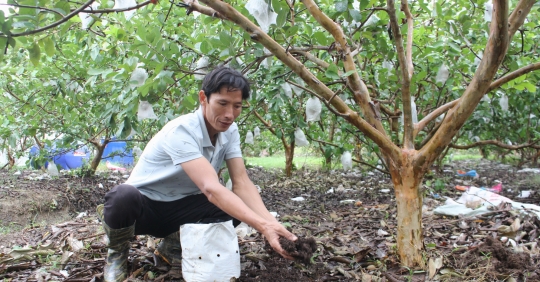[ad_1]
NINH BINH By adopting a closed-loop, organic, circular-growing process, Mr. Quyen’s farm saved a lot of production costs and protected the environment.
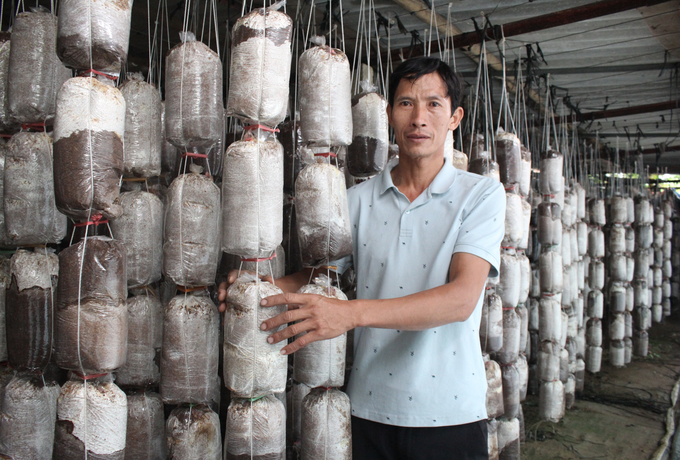
Mushroom farming has helped Quyen utilize many by-products, provide him with a high income, and provide a source of organic fertilizer for plants. Picture: Trung Quan.
Organic farming, closed circuit, saving 40% fertilizer costs
Visiting Mr. Nguyen Van Quyen’s general farm in Quan Hamlet, Yen Phong Commune (Yen Mo, Ninh Binh), no one can help but be surprised at how novel and effective things are done when the farm produces a variety of agricultural products , different, but absolutely no waste in the environment.
Mr. Quyen said: His family’s general farm has an area of more than 5 ha. In which the planting area of guava and apple is more than 4 ha; melon in the membrane house extension 2,000 m2; Mushroom cultivation area 5,000 m2; French pigeon house 400m2…
However, starting out as a craftsman without any knowledge of mushroom cultivation, I once happened to hear a story about getting rich from ear fungus (wooden ear) from a friend with curious nature, he has been crafting with curiosity and passion ever since.
In 2009, he borrowed more relatives and friends with a small amount of capital to invest VND 100 million and buy 10,000 bags of Nam Dinh cat ear mushrooms to try. Fortune smiled on him when he was in hand with little knowledge, but he still made a profit on the first batch of mushrooms, although it wasn’t much. On this basis, by 2010, he expanded the scope of mushroom cultivation to 40,000 bags.
While working and studying, he traveled countless times from Ninh Binh to Nam Dinh to improve his knowledge and experience in mushroom cultivation. The owner of the mushroom seed production plant admired his diligence and passion and decided to pass on to him all the “secrets” of the mushroom production process for use.
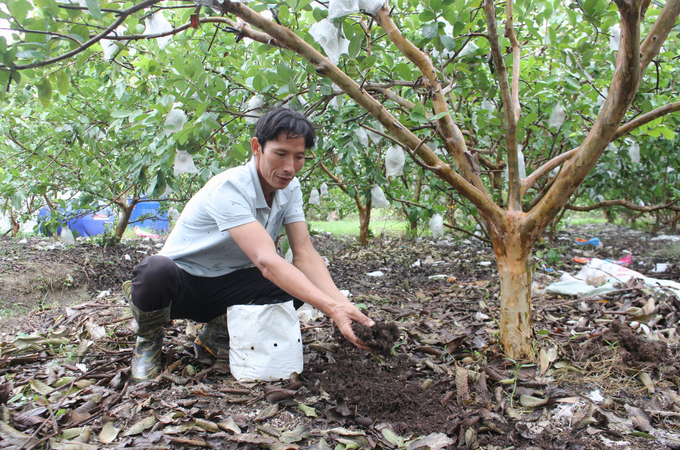
Thanks to the application of agriculture towards circularity, towards closed organic, Mr. Nguyen Van Quyen’s farm has reduced a number of costs, for safe quality products and environmental protection. Picture: Trung Quan.
When he felt that his knowledge of mushroom cultivation was mature, he boldly invested in the cost of renting land, building factories, purchasing machinery and raw materials, etc. to produce mushrooms in large quantities.
Quyen said: “When growing mushrooms, it was found that the mushroom residue (the bag left after harvesting) was wasted because it was carefully mixed with sawdust, rice bran, lime and manure, fertilizer… can be fully utilized by other crops.” .
While struggling to find a suitable plant, the Ninh Binh Provincial Agricultural Advisory Center brought guava trees to test the model planting in their home community. The results obtained are that the guava tree is suitable for the field, grows and develops well, and offers high economic efficiency. Like catching gold, he learned right away and brought this variety of guava to try.
So, the amount of mushroom residue was collected, beaten and putrefactive manure, and then applied to the guava garden. Unexpected results as the garden soil became porous, the guava tree grew healthily, the tree strength was high (the guava garden is 7 years old but the trees are still green), yield and quality increased. .
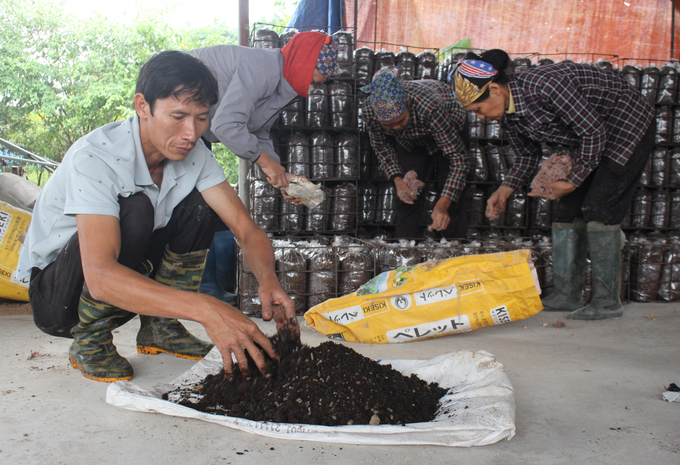
Mushroom residue is used by him, adding organic fertilizers, soaked probiotics to fertilize melon, guava and apples. Picture: Trung Quan.
In 2019 he took the cantaloupe plant outdoors to try it out and started developing the farm in an organic direction. At that time, the fungus residue was fully utilized by him to make fertilizer in the following way: After harvesting the wood ear fungus, the fungus residue was added organic fertilizer, probiotics (2nd time), composted for use as food fertilizer Cantaloupe melon. After harvesting the cantaloupe, the potting soil continues to be supplemented with organic fertilizers and probiotics, soaked and composted for the 3rd time to fertilize guavas and apples.
In addition, to ensure an adequate supply of fertilizer for plants, he built a cage to raise 1,000 pairs of French pigeons, both to have an additional source of income and to have the amount of fertilizer for the plants. In addition, all the by-products of the production process (broken spikes of wood, post-harvested melon bodies, grass, leaves…) are used by him, soaked in probiotics and rotted to make fertilizers to improve soil and fertilize plants.
Using this method, his farm can produce an average of 60-70 tons of organic fertilizer for plants every year. Especially the guava garden only needs to add a negligible amount of organic fertilizer.
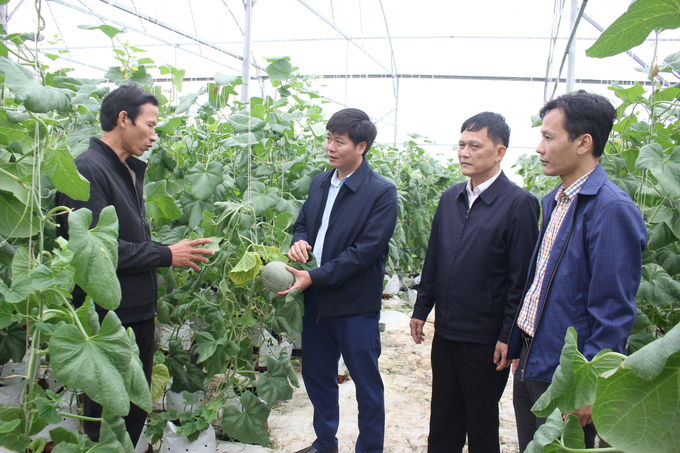
Heads of Ninh Binh Ministry of Agriculture and Rural Development, Yen Mo District People’s Committee and Ninh Binh Center for Agriculture, Forestry and Fisheries have issued many policies to support agricultural production models towards circular, organic production. There is Mr. Quyen’s farm brother. Picture: Trung Quan.
Regarding the prevention and treatment of diseases in trees, Mr. Quyen shared: For the areas planted with guavas and apples, he does not use chemical pesticides, but actively prevents diseases in trees from a young age; mechanical or manual weeding, use of tarpaulins to limit weeding; pods for preventing insect damage; Use pesticides and organic products on plants only when necessary.
For melons, as of early 2022, his family has been supported by the Yen Mo District People’s Committee with 40% of the cost of building a greenhouse system that adopts Israeli irrigation technology and is automatically controlled by smartphones; The Ministry of Agriculture and Rural Development, Center of Agriculture – Forestry – Fisheries Extension Ninh Binh provides technical support to care, so he hardly needs to use pesticides.
“If fertilizers, chemical pesticides and herbicides are used, the cost is lower, the effect is faster, but it is very harmful to the soil, health and the environment. I’m in the garden every day, if I use too much chemical medicine, I’m the first to be affected; Steps in the garden all day, gradually the medicine is absorbed into the body at any time. Organic farming, manual weeding, although more work, but the health of self, workers, soil and water is protected,” Quyen said.
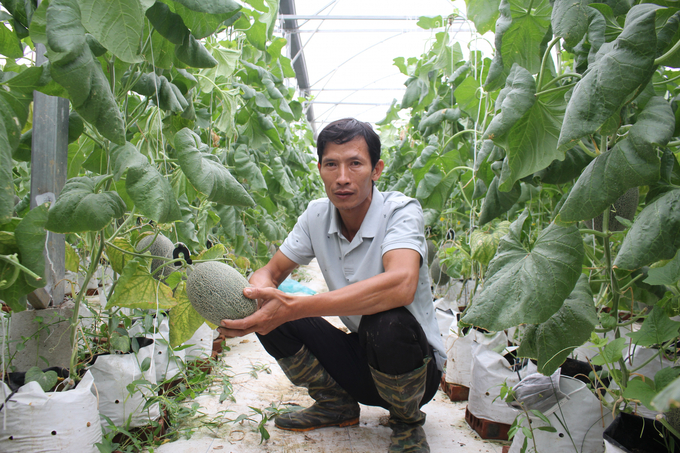
The melon farm collects 4 litters/year with an average profit of 50 million VND/1,000 m2/crop. Picture: Trung Quan.
Mr. Quyen informed about the economics: Safe farming, closed circuit saves about 40% of the fertilizer costs compared to the previous traditional method.
For melons, he gets 4 crops/year, after deducting costs, he has an average profit of 50 million VND/1,000 m2/crop. So, with 1,000 m2 in one year, he earned about 200 million VND.
For guava, the average yield is about 50 tons/ha/year. With the high selling price of 13,000-15,000 VND/kg, the lowest 6,000-8,000 VND/kg, after deducting the cost, he has a profit of about 250-300 million VND/ha/year. For mushrooms, he earns an average of 8-9 tons of dried wood ear mushrooms per year with an average turnover of VND 1 billion/year (excluding expenses).
Combining agriculture with tourism development
Mr. Dinh Van Khiem, Deputy Director of the Ministry of Agriculture and Rural Development of Ninh Binh said: In the development orientation, Ninh Binh identifies tourism as an important economic sector that makes an important contribution to the socio-economic development of the province. However, the nature that favors Ninh Binh with the wonders that captivate people is still not enough for every visitor to remember it forever.
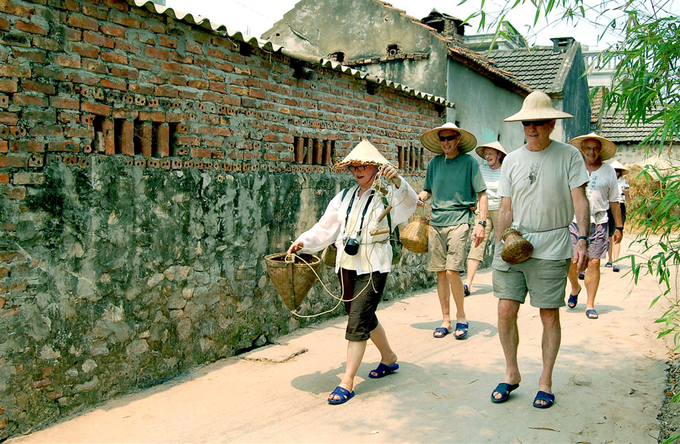
The agricultural sector of Ninh Binh Province will have many strategies to develop safe, ecological and circular agricultural production, effectively serving tourism development. Picture: Trung Quan.
Starting from a purely agricultural province, Ninh Binh has therefore made a clear decision to closely link the development of agriculture with tourism. Tourism development will help create stable jobs for rural workers; to preserve and preserve the unique cultural values of the place.
In addition, tourism will encourage people to change agricultural methods, plant and animal structures towards the application of scientific and technological advances to reduce production costs and protect the environment. Creation of safe organic and specialty products under Ninh Binh brand for tourism; Creating favorable conditions for the strong development of agricultural and rural tourism … From there, increasing the competitiveness and value of agricultural products to help people increase their income and stabilize their lives.
Synchronous and long-term solutions are needed for agriculture to truly become a ‘pivot’ for tourism, according to Mr Dinh Van Khiem, deputy director of the Ministry of Agriculture and Rural Development in Ninh Binh. In particular, the development of circular agricultural production is regarded as the key to solving the requirements of resource-saving, environmental protection, climate change response and sustainable development; Creation of space and environment for tourism development.
[ad_2]
Source link

